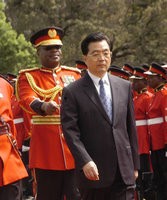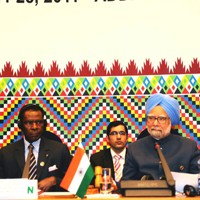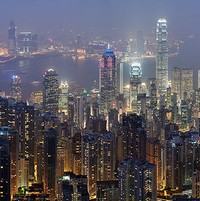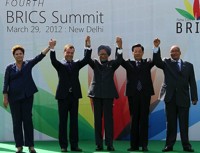Taiwanese President Ma Ying-jeou made a surprise refueling stop in Mumbai, India, earlier this month while en route to Africa. In an email interview, Fang Tien-sze, an assistant professor at National Tsing-hua University in Hsinchu, Taiwan, and Jabin T. Jacob, assistant director of the Institute of Chinese Studies in Delhi, India, discussed India-Taiwan relations. WPR: How have India-Taiwan relations evolved over the past 10 years? Fang Tien-sze and Jabin T. Jacob: India-Taiwan relations have improved gradually in many areas over the past few years. Bilateral trade has expanded from $1.1 billion in 2001 to $7.6 billion in 2011. The two […]
Economics & Business Archive
Free Newsletter
Under pressure from Brasilia, Mexico agreed last month to limit its automotive exports to Brazil, prompting Argentina to threaten to revoke its own trade agreement with Mexico in an effort to gain further concessions. In an email interview, Barbara Kotschwar, a research associate at the Peterson Institute for International Economics, discussed the Economic Complementation Agreement 55 (ACE 55), the 2002 automotive trade deal between Mexico and Mercosur, the trade bloc comprised of Argentina, Brazil, Paraguay and Uruguay. WPR: What is the current state of trade between Mexico and Mercosur, particularly Brazil and Argentina, and what is the ACE 55 agreement […]
In yet another disagreement between China and its neighbors over the disputed South China Sea, the Philippines last week claimed that one of its naval patrols had discovered eight Chinese fishing vessels loaded with illegal catch in an area it considers to be within its own exclusive economic zone. When the Philippine patrol refused to allow the fishing boats to leave the area without discharging their catch, China speeded three maritime survey ships to the area. Since then, the two countries have engaged in a standoff that continues, even though the Philippine warship allowed the fishermen to leave the area […]

International relations experts are pretty much down on everything nowadays. America, we are told, is incapable of global leadership: too discredited overseas, too few resources back home, too little will — period. For a brief moment there, while China held up the global economy during the recent financial crisis, much credence was given to the notion that we were on the verge of a Chinese century. But that popular vision has also waned surprisingly quickly, and now the conventional wisdom centers on China’s great weaknesses, challenges and overall brittleness. Amazingly, where we spoke of a U.S.-China “G-2” arrangement just a […]
Over the past decade, rising energy prices and new techniques and technologies have allowed global energy companies to bring online new oil and gas reserves in East African countries, including Tanzania and Mozambique. But as the demand for fossil fuels grows among energy-hungry emerging economies, investors are also opening up production in previously unexplored areas. And in East Africa, this means major opportunity as well as major uncertainty. “What could really make a difference is if these countries coordinate their strategies and their resources effectively,” said Richard Downie, deputy director of the Africa program at the Center for Strategic and […]

It is no surprise that piracy has steadily climbed up the ranks of threats to India’s security, given India’s energy trade with the Middle East. But now, with vast untapped oil reserves reported in Somalia and just off its coast, piracy emanating from the Horn of Africa is impinging on India’s future energy sourcing opportunities as well. Further complicating India’s plans for the region is the nexus between Somali pirates and the al-Qaida affiliate al-Shabab, which still has a significant presence in central Somalia and provides sanctuary to pirate fleets operating out of the central Somali city of Harardhere in […]

Colombia is in the midst of a mining boom, with high commodities prices and Chinese demand placing its nascent mining sector at the center of the country’s economic development model. The challenge for Colombian President Juan Manuel Santos is to capitalize on the sector’s promise, while avoiding some of the environmental and social challenges that have impacted other South American mining countries, such as Chile and Peru. These challenges are particularly salient for newcomers like Colombia, whose mining sector is slowly taking off. Excluding oil, mining now accounts for 30 percent of the country’s foreign investment and 24 percent of […]

Argentine officials have been ratcheting up the pressure on Spanish-owned oil company YPF-Repsol, demanding increased investment in hydrocarbon production against a backdrop of declines in output that have made Argentina one of the fastest-growing import markets for natural gas. The threat of a similar scenario with oil has the government on the offensive against the nation’s top energy company. The gas shortage is reverberating throughout the rest of the economy, driving import restrictions to shore up the trade balance and tighter currency controls to ensure the availability of dollars for purchases of foreign gas. Looking forward, the government’s posture on […]
In the midst of commemorations of the 100th anniversary of the birth of its founder, Kim Il Sung, North Korea is apparently preparing to fire a ballistic missile. While Pyongyang insists the rocket launch is for the sole purpose of sending a satellite into orbit, most analysts say the launch is an effort to develop ballistic missile technology to support North Korea’s growing nuclear weapons program. The satellite launch is seen as a clear violation not only of United Nations resolutions requiring North Korea to suspend activities — including launches — related to its ballistic missile program, but also of […]

Since sovereignty over Hong Kong was returned from Britain to the People’s Republic of China (PRC) on July 1, 1997, the island has maintained the rule of law and civil liberties. Nevertheless, politically and economically, Hong Kong has also experienced some degree of “mainland-ization” under the “one country, two systems” system that frames relations between the Special Administrative Region and Beijing. At the same time, economic integration with the island has resulted in a process of “Hong Kong-ization” of the mainland, if less dramatically. The impact of both phenomena has implications not only for relations between the two, but also […]

Ever since Goldman Sachs economist Jim O’Neill defined the BRIC group of countries in 2001, policymakers have been closely watching the rise of the presumed leaders of the 21st century. And it was widely expected that as Brazil, Russia, China, India and recently added South Africa exercised growing power in global politics, they would also play a larger role in efforts to promote global development by using their own success as a template for smaller and lesser developed states. At their recent summit in New Delhi, the BRICS heads of state signaled their intention to take up that responsibility. The […]

The economic reforms that began in China in the early 1980s triggered one of the largest population movements in human history. Since they began, in each decade, tens of millions of rural people have left the land to seek higher incomes by working or trading in urban areas. The census in 2000 found that there were more than 120 million migrant workers in Chinese cities. More-recent estimates go as high as 200 million. This massive internal migration has appeared especially dramatic from a Chinese perspective because mobility was severely restricted in Maoist times, making it almost impossible for rural people […]

When the Department of Homeland Security (DHS) was established in March 2003, one of the new department’s primary goals was to enhance U.S. cybersecurity. But after several years passed without major DHS initiatives in this area, observers concluded that the department was insufficiently prepared or resourced to address cyber emergencies. Indeed, prior to the 2008 presidential election, the influential think tank Center for Strategic and International Studies’ Commission on Cybersecurity recommended that the next occupant of the White House formally revoke DHS’ limited authority to coordinate cybersecurity because the department, having never had authority over the U.S. military, intelligence community […]

Writing in Foreign Affairs this month, Henry Kissinger opined that, when it comes to the future of Sino-American relations, “conflict is a choice, not a necessity.” Those are some serious words from one of history’s all-time realists, but more important than his analysis is the fact that he even felt the need to issue that public statement regarding these two ultimately codependent superpowers. A trusted part-time adviser to President Barack Obama, Kissinger knows he has the president’s ear on China, the target of this administration’s recently announced strategic military “pivot” toward East Asia. The codependency at work here isn’t the […]
